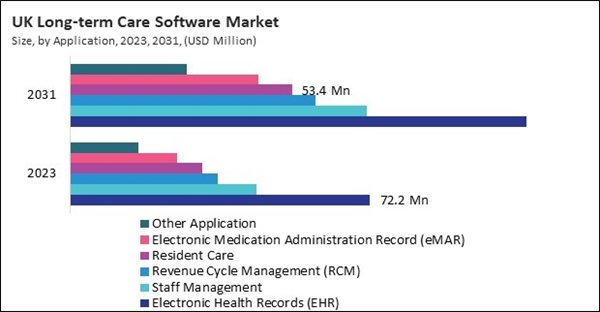The Germany market dominated the Europe Long-term Care Software Market by country in 2023, and is expected to continue to be a dominant market till 2031; thereby, achieving a market value of $445 million by 2031. The UK market is exhibiting a CAGR of 6.4% during 2024-2031. Additionally, the France market would experience a CAGR of 8.5% during 2024-2031.
Care planning modules assist in developing, tracking, and adjusting personalized care plans for residents. These tools help caregivers manage daily tasks, monitor patient progress, and adjust care plans as needed based on real-time data and analytics. Medication administration is a critical aspect of long-term care. Software solutions in this area help ensure accurate medication dispensing, reduce medication errors, and enhance adherence to prescribed treatment regimens.
Efficient staff management is crucial in long-term care settings. Scheduling software helps allocate staff resources effectively, ensuring adequate coverage and reducing burnout. These systems also handle time tracking, payroll management, and compliance with labor regulations. These portals provide residents and their families with access to important information, including care plans, progress reports, and communication tools.
The government’s €1.67 billion investment in EMR and e-health technology as part of the National Recovery and Resilience Program (NRRP) is expanding the use of EMRs nationwide. With 35% of the population using EMRs, the demand for this software that integrates with these systems is increasing, improving patient data management and care coordination in long-term care settings. The impact of chronic diseases on public health in Europe is a significant factor driving the growth of this market. According to Eurostat, in 2020, there were 347,867 deaths in the EU attributed to respiratory diseases, accounting for 6.7% of all deaths. In conclusion, Europe’s increasing investment in healthcare technology, including EMRs, telemedicine, and rising chronic diseases, is poised to drive significant growth in the long-term care software market, improving care delivery and operational efficiency across the region.
List of Key Companies Profiled
- Veradigm LLC
- Oracle Corporation
- MatrixCare (ResMed Inc.)
- Yardi Systems, Inc.
- PointClickCare
- Medtelligent, Inc.
- ALAdvantage, LLC
- Netsmart Technologies, Inc.
- Kareo, Inc.
- Caresmartz, Inc.
Market Report Segmentation
By Mode of Delivery
- Cloud Based
- On Premise
- Web Based
By Application
- Electronic Health Records (EHR)
- Staff Management
- Revenue Cycle Management (RCM)
- Resident Care
- Electronic Medication Administration Record (eMAR)
- Other Application
By End Use
- Nursing Homes
- Home Healthcare Agencies
- Assisted living facilities
- Hospice & Palliative care
- Other End Use
By Country
- Germany
- UK
- France
- Russia
- Spain
- Italy
- Rest of Europe
Table of Contents
Companies Mentioned
Some of the leading companies profiled in this Europe Long-term Care Software Market report include:- Veradigm LLC
- Oracle Corporation
- MatrixCare (ResMed Inc.)
- Yardi Systems, Inc.
- PointClickCare
- Medtelligent, Inc.
- ALAdvantage, LLC
- Netsmart Technologies, Inc.
- Kareo, Inc.
- Caresmartz, Inc.









